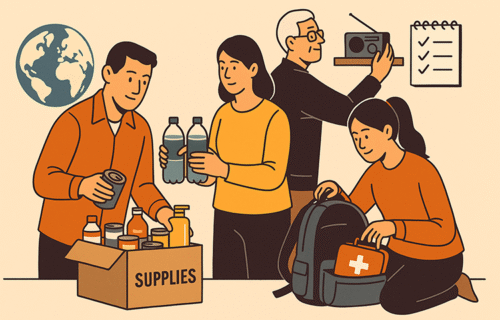Across much of Europe, an old idea is being revived under new circumstances: the notion that ordinary citizens should know how to cope when things go wrong. From the Baltic to the Alps, governments are quietly reintroducing public guidance once associated with a more anxious age — civil defence for the modern world.
The shift began in the north. Sweden’s national agency for civil protection delivered a wake-up call several years ago with a booklet distributed to every home, explaining what to do if power, communications, or even peace itself were suddenly disrupted. Finland soon followed with its own initiative, urging households to be able to manage for three days without outside help. Norway, Denmark, and Switzerland have issued similar handbooks, complete with checklists, emergency contacts, and reassurance that preparation is an act of responsibility, not alarm.
In Germany, the message has now reached the mainstream. This autumn, the Federal Office of Civil Protection released a new national guide that broadens its focus beyond floods and storms to include more complex threats — from cyberattacks to armed conflict. Officials stressed that Germany remains one of the safest countries in the world, yet that being ready for short-term disruption is simple common sense. The publication encourages people to keep enough essentials at home for up to ten days and to think ahead about water, medicine, and communication in case of power outages.
Elsewhere, governments have begun speaking more openly about resilience as a shared civic duty. Poland has launched an awareness campaign on how to stay supplied during emergencies, while France has modernised its family safety plans to cover longer periods without utilities. Estonia and Lithuania, both with fresh memories of regional insecurity, now train citizens to recognise disinformation alongside more traditional guidance on first aid and shelter.
The reasons for this renewed attention are easy to trace. The war in Ukraine exposed how quickly the balance between peace and crisis can shift. At the same time, Europe’s energy network, food supply chains, and digital systems are increasingly interconnected — and therefore more vulnerable to interruption. Whether from conflict, cyber sabotage, or extreme weather, disruption in one country can quickly reach another.
Yet the tone of these new guides is neither alarmist nor fatalistic. Their authors speak less about fear and more about empowerment — knowing where to find reliable information, how to help neighbours, and how to reduce strain on emergency services when systems are under pressure. The advice is practical, often as simple as having a flashlight, a radio, or an extra bag of pasta.
In many ways, Europe is rediscovering something it once took for granted: that preparedness begins at home. A stocked cupboard, a plan for contacting family, and an understanding of how local alerts work may sound mundane, but in an uncertain world, these small steps add up to collective strength.
Far from signalling panic, Europe’s new wave of civil protection guides reflects a sober understanding of today’s risks — and a belief that resilience is as much about community as it is about crisis.
Disclaimer: This article is for informational purposes only. It does not constitute policy, legal, or professional advice. CIJ.World accepts no responsibility for actions taken based on this content.
